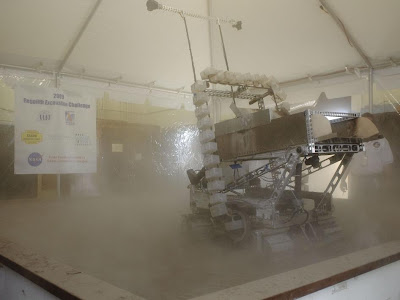
Nineteen teams pushed their robot competitors to the limit, and three teams claimed a total of $750,000 in NASA prizes at this year's Regolith Excavation Challenge on Oct. 17-18. This is the first time in the competition's three-year history that any team qualified for a cash prize, the largest NASA has awarded to date.
After two days of intense competition hosted at NASA's Ames Research Center at Moffett Field, Calif., organizers conferred first place prize of $500,000 to Paul's Robotics of Worcester, Mass. Terra Engineering of Gardena, Calif., was a three-time returning competitor and was awarded second place prize of $150,000, and Team Braundo of Rancho Palos Verde, Calif., took the third place of $100,000 as a first-time competitor.
Competitors were required to use mobile, robotic digging machines capable of excavating at least 330 pounds of simulated moon dirt, known as regolith, and depositing it into a container in 30 minutes or less. The rules required the remotely controlled vehicles to contain their own power sources and weigh no more than 176 pounds.
The winning excavator lifted 1,103 pounds within the allotted time. Runners-up excavated 595 pounds and 580 pounds, respectively. Team E-REX of Little Rock, Ark., earned a special mention for transferring the most regolith in a single deposit -- 165 pounds.
Shown here is the Braundo Rancho excavator digging up simulated lunar dust, known as regolith.
After two days of intense competition hosted at NASA's Ames Research Center at Moffett Field, Calif., organizers conferred first place prize of $500,000 to Paul's Robotics of Worcester, Mass. Terra Engineering of Gardena, Calif., was a three-time returning competitor and was awarded second place prize of $150,000, and Team Braundo of Rancho Palos Verde, Calif., took the third place of $100,000 as a first-time competitor.
Competitors were required to use mobile, robotic digging machines capable of excavating at least 330 pounds of simulated moon dirt, known as regolith, and depositing it into a container in 30 minutes or less. The rules required the remotely controlled vehicles to contain their own power sources and weigh no more than 176 pounds.
The winning excavator lifted 1,103 pounds within the allotted time. Runners-up excavated 595 pounds and 580 pounds, respectively. Team E-REX of Little Rock, Ark., earned a special mention for transferring the most regolith in a single deposit -- 165 pounds.
Shown here is the Braundo Rancho excavator digging up simulated lunar dust, known as regolith.